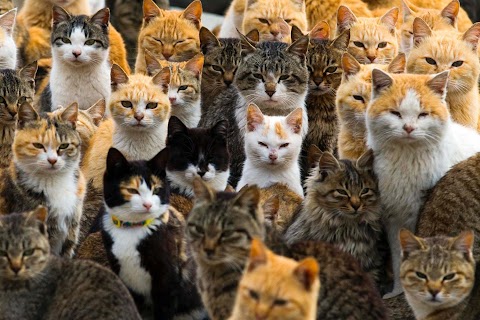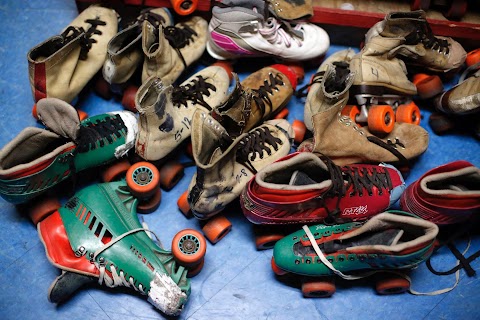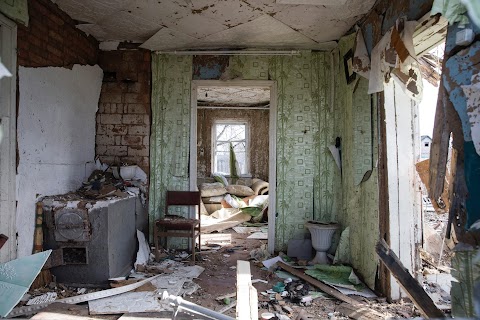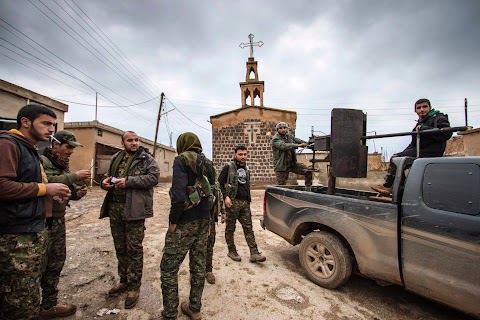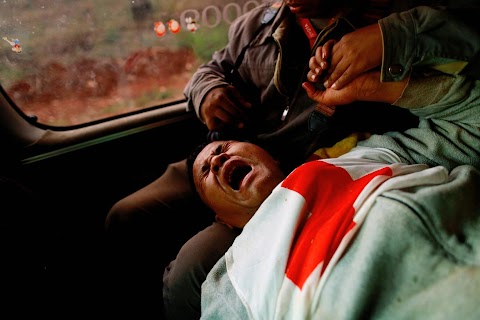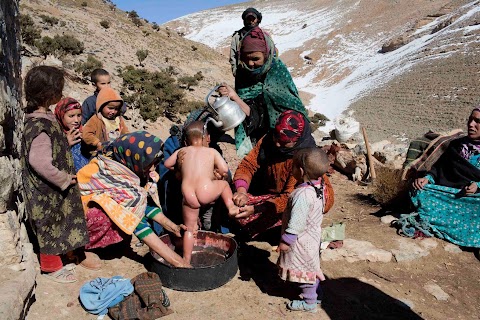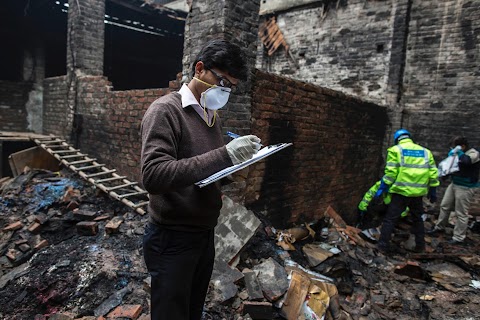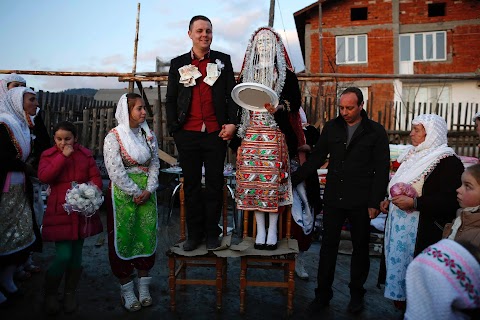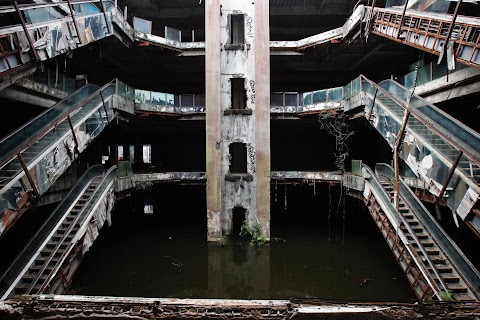
The big smoke
 Kim Kyung-Hoon
Kim Kyung-Hoon
Artist Kong Ning wears a 10-meter-long wedding dress decorated with 999 face masks as part of her performance ‘Marry the blue sky,’ which expresses frustration with air pollution and her longing for her country to have clean air.
Decades of red-hot economic growth in China have lifted hundreds of millions out of poverty, but rapid industrialisation has taken its toll on the environment and led to dangerous levels of air pollution in the capital city.

Over the past seven years, levels of particulate matter in Beijing's air smaller than 2.5 micrometres in diameter (PM2.5) averaged nearly five times the recommended daily level set by the World Health Organization, according to data from a monitoring station at the U.S. embassy.
The medical implications of sustained exposure are sobering. A study by Greenpeace and scientists at Peking University based on 2013 data attributed more than 257,000 premature deaths in 31 Chinese cities to PM2.5, making it a bigger killer than smoking.

Fashion designer Chi Zhang has turned gas masks into a trademark. He uses his work, seen above on a model taking a break during a fashion show rehearsal, to express concern about pollution.
Awareness of the dangers of Beijing's skies is on the rise, and people are becoming increasingly concerned about medical implications of sustained exposure to the polluted air.

Liu Ruiqiang uses a handheld pollution sensor to measure air quality on his balcony. For years, he put up with chronic smog in Beijing, but he didn't want to take any chances when his daughter was born.
On days when air pollution reaches hazardous levels, little Yunshu is confined to their home, where a pair of constantly whirring air purifiers make it safer to breathe.
Liu, who says he's a lower-middle class Beijinger, estimates he has spent more than 40,000 yuan ($6,375) in the past couple of years to counter the effects of pollution.
"If we don't think of a way to balance it out or find some basic ways to help us recover, eventually our health will be destroyed," the 37-year-old said.

Rising public discontent over the state of the environment has proved a powerful catalyst for change amid signs the government is starting to take the environment seriously.
China will "declare war on pollution," Premier Li Keqiang told parliament in an opening address in 2014. A tougher environmental law took effect at the start of the year.
But citizens must push harder to ensure environmental measures triumph over business interests, one expert said.
"In China, what we need is wide participation from society, and monitoring from the public to make sure the laws are implemented," said Ma Jun, founder of the Institute of Public and Environmental Affairs.
For now, Liu sees no silver lining in Beijing's toxic cloud.
"It's very unlikely we'll see the pollution issue being solved in the next 10 years," he said. "It's not realistic."
Before & After


Before: Statues of Pandas are seen on a polluted day in Beijing.
After: The statues are seen on a sunny day.
Before & After


Before: A statue of China's late Chairman Mao Zedong stands in Beijing on a polluted day.
After: The statue is seen on a sunny day.
Before & After


Before: The National Grand Theatre, which has been nicknamed "The Egg", is seen on a polluted day.
After: The theatre is seen on a sunny day.
Before & After


Before: Beijing cityscape is seen through pollution.
After: The cityscape is seen on a sunny day.
"Masks and air purifiers have become common life necessities."
Waking up in my bedroom, my mouth was dry and I felt a tickle in my throat. Without even looking at the sky out of the window, I intuitively sensed that Beijing was having another of its bad air-quality days.
My wife checked an application on her smartphone showing the air quality index (AQI) of Beijing.
“We should wear face masks and not take our children outdoors today,” she said with a deep sigh. Then she raised the strength level of the air purifiers in our bedrooms and living room.
It is the usual routine in our home whenever Beijing is besieged by heavy pollution. Sadly this happens many times a year. According to data released by the Beijing Environmental Protection Bureau, the city enjoyed only 93 days of excellent air quality in 2014.
In the past, many Chinese thought a hazy day was just a day of bad weather. But as citizens have become more aware of the problems caused by the lingering air pollution, they have begun making lifestyle changes.
Masks and air purifiers have become common life necessities. Those who cannot afford expensive gadgets flock to workshops to learn how to make DIY versions using simple housing fans and filters.
Indoor playgrounds are now popular spots with parents who want to keep their children away from the bad air outdoors. Checking the AQI is as important as checking the weather report. Special masks with big filters, usually used by heavy industrial workers, have become one of the few choices available for joggers and cyclists.
A medical product vendor, Liu Ruiqiang, also once regarded a polluted day as just a bad weather day. He became concerned after his little daughter developed a respiratory problem that he believed was caused by polluted air. He studied the topic and became an expert on it.
Now he carries a very expensive and elaborate air pollution detector, measuring the air quality around him every hour during the times when Beijing’s air is heavily polluted. His new rule for his daughter is simple but strict: no outdoor activity on polluted days.
For some, the pollution has created new possibilities.
Chinese companies are busy launching new types of masks and the polluted air has given rise to a booming market in air purifiers as demand from consumers grows.
Fashion designer Chi Zhang, known for work reflecting concern about the capital’s air quality problems, has turned the embellished image of a gas mask into his trademark.
In Zhang’s fashion show, models wearing masks parade across a stage covered with dense fog. His creations are branded with “Fxxk Air Pollution”.
For artist Kong Ning, desire to have clean air sparked her artistic creativity. For her performance piece “Marry the Blue Sky”, Ning created a wedding dress decorated with 999 face masks. The 10-meter-long dress symbolises her frustration with the air pollution and her wish for China to have clean air.
To capture her art in pictures, we went to the front of the CCTV Tower, one of Beijing’s best-known landmarks. I was excited but also concerned that the police might stop us as air pollution is a sensitive issue for the Chinese government.
Unfolding the long wedding dress on the busy street was not easy, and we had to be quick. Ning brought a friend to help her get the wedding dress on; I chose a good spot to shoot from and didn’t forget to check for any policemen around us. Fortunately, we were able to finish our mission without being intercepted.
Slideshow

Liu Ke's mask and a filter which he had used for two weeks are seen on a table next to a new filter.

Ke, who cycles almost every day to avoid Beijing's congested traffic, said he has to wear the mask when air quality is low to protect himself from hazardous pollution.

Wang Yan stretches after a jog in a park.

Yong Xiaoyan, wearing a nose mask, works at her office. Xiaoyan said she had used the mask every day after finding out she was pregnant out of the concern that the pollution could harm her foetus.

Xiaoyan puts on a nose mask.

Students hold a HEPA filter as they prepare to put it on a fan during a workshop teaching how to make DIY air purifiers.

J.Kim fills a bottle with a herbal tea recommended by his doctor. The Korean expatriate, who has lived and worked in China for over 10 years, suffers from chronic rhinitis and asthma that he believes have been caused by Beijing's polluted air.

Kim takes a medicine for his bronchial problems. He has decided to leave China because of the air pollution.

Fashion designer Chi Zhang poses with a face mask, one of his trademark designs.

A model walks the runway during a rehearsal for Zhang's fashion show.

Researchers analyse air quality at a lab in Beijing’s municipal environmental monitoring centre.

A boy looks at an air purifier 'Adventure Zone.’

Children play at one of Beijing’s indoor playgrounds, popular with parents wanting to protect their kids from pollution outdoors.

Kong Ning poses at her studio, wearing a wedding dress made of 999 face masks for her performance art piece.


